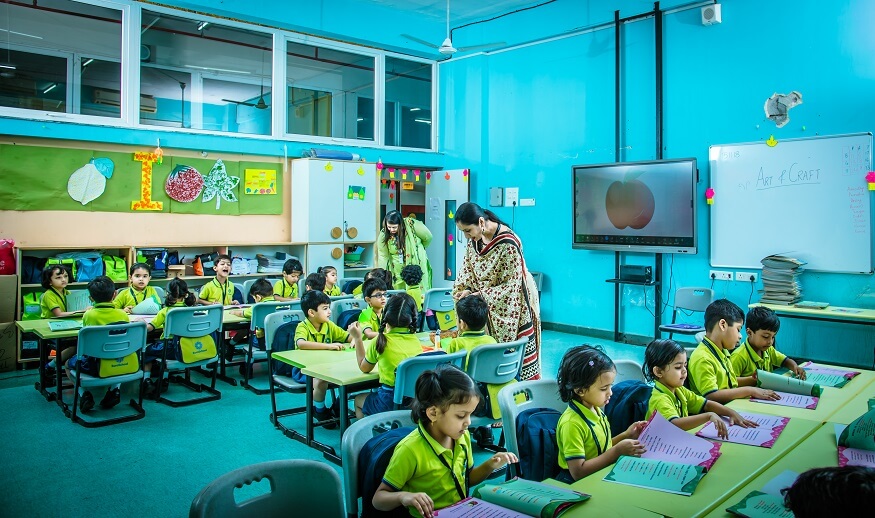Primary schooling is the starting phase of education that lays the foundation for a child’s learning journey. It is a crucial period where children develop fundamental skills, gain knowledge, and shape their overall growth. In India, Primary education has two parts, Lower Primary (Class 1 to 4), and Upper Primary (Class 5 to 7). This education helps students between the ages of 5 and 11 when children begin to search for information, skills, and personal development. In India for many students, primary education is the gateway to a better life. It teaches children the fundamental reading, math, and life skills necessary to escape the cycle of materialism and achieve success in life.
Primary school has created an important impact on both parents and students, especially underprivileged children. The basic goal of education is more than just textbooks and classrooms. It’s an air of hope and a start towards a brighter future. It gives parents hope and a sense of pride as they see their children get an education that was previously out of reach for them and they can see their growth. For students, elementary school acts as an opportunity to make a change in their lives. Primary schooling provides them with the necessary information, skills, and chances, allowing them to break free from the bonds of inequality.
Parents should be aware of the importance of primary education. It provides the strong Foundation of Learning, Holistic Development, and Equal Opportunities. It equips children with essential literacy and numeracy skills, enabling them to communicate effectively, understand information, and solve everyday problems. The major need of primary education is Economic Growth, which means a well-educated population drives economic growth and development by equipping individuals with the skills and knowledge needed for the workforce, innovation, and productivity.
CHALLENGES IN ACHIEVING PRIMARY EDUCATION
Inadequate Access
A lot of children continue to be denied access to elementary education, particularly in poor areas and those who are marginalised. Poverty, geographical isolation, and discrimination all restrict children from attending school.
Education Quality
According to the quality of elementary education, the quality of schools and their education is different. Lack of resources, a shortage of skilled teachers, outdated teaching techniques, and a lack of space all restrict successful learning.
Learning Disparities
Not all elementary school students learn the basic fundamental abilities. High rates of expulsion, particularly among girls and children living in fragile environments, lead to learning deficiencies. The situation gets worse further by a lack of access to high-quality teaching and learning resources.
Equality and inclusiveness
Justice and diversity must be addressed in order to attain elementary education. Here children with a lack of money, particularly those with disabilities, face educational barriers as a result of discrimination, stigma, and a lack of inclusive policies and infrastructure.
Poverty and inequity
It has a major impact on a child’s capacity to attend and succeed in elementary school. In other cases, schooling is made difficult by a lack of money, a lack of parental support, and the requirement of child work.
Also Read | Importance of School Education
IMPORTANCE OF PRIMARY EDUCATION
The below-mentioned key points will help a parent understand the importance of primary education.
Building Fundamental Skills
Children learn key skills such as reading, writing, arithmetic, and problem-solving during this time. These abilities serve as the foundation for future success.
General development
Primary education promotes overall growth by developing cognitive, physical, social, emotional, and creative qualities. It encourages children to follow their interests, increases their confidence, and improves their critical thinking abilities.
Socialization and Communication
Primary education develops social skills and effective communication via collaborative activities, group projects, and extracurricular commitments, allowing children to connect successfully with their classmates and the larger society.
Instilling Values
Fundamental moral values such as respect, empathy, honesty, accountability, and collaboration are instilled in primary school. These principles aid in the development of ethical persons capable of navigating problems with integrity and compassion.
OBJECTIVES OF PRIMARY EDUCATION
Individualised Learning
We recognise that each kid is unique, with various talents and learning styles. Our primary education program is intended to meet the requirements of each individual student, ensuring that each student receives personalised attention and assistance.
Fostering Curiosity and Love for Learning
We want to cultivate a love of learning in every kid. We inspire curiosity, discovery, and a lifelong hunger for knowledge by providing a vibrant and engaging atmosphere.
Cultivating Critical Thinking
It is the main objective of primary education, which highlights critical thinking skills development, allowing students to analyse, evaluate, and solve issues on their own. It’s leads to originality, innovation, creation, and the capacity to think out of the box
Encouraging Well-rounded Development
Our primary school program incorporates academics, athletics, arts, and extracurricular activities. We believe in developing well-rounded individuals who can excel in various domains.
EVOLUTION OF PRIMARY EDUCATION
Primary education has evolved tremendously throughout time, switching from traditional structures to more modern and student-centred approaches. These modifications have led to various advantages for learners, teachers, and the overall learning experience.
When comparing primary education before and after, the current approach is considered excellent. Primary education has traditionally depended on memorising facts by heart and teacher-centred learning, which limits critical thinking and active involvement. The modern approach, on the other hand, focuses on student-centred learning, interactive approaches, and technological integration. It increases critical thinking, problem solving, creativity, and overall growth.
The modern system prepares students for the challenges of today’s world by providing them with the necessary skills and encouraging an appreciation of study. The modern primary education strategy provides a more effective and complete learning experience for students by integrating innovation, personalised learning, and overall growth.
Teachers play an important part in today’s primary education system. They act as educators, helping students on their learning journeys and offering special assistance. Integrated learning spaces and constant professional development opportunities enable instructors to use new teaching practices and adapt to an ever-changing educational context.
Also Read: What is the Best Age to Start Kindergarten
CONCLUSION
At EuroSchool, we understand the need of primary education and believe that it is the foundation of personal development and achievement. With world-class infrastructure, we are dedicated to providing your kid with a loving and encouraging primary education experience. Know our school admission process and let your child access primary education which will help shape them into responsible citizens. You can also visit our school to check out our campus where we strive to provide a holistic learning experience











